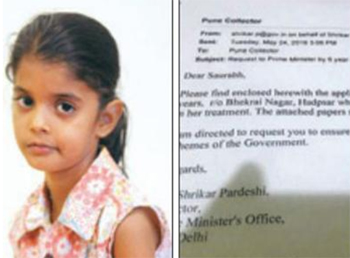Pune, Jun 8: A six-year-old Pune girl suffering from a heart disease wrote a letter to Prime Minister Narendra Modi seeking financial help which was promptly granted following which she underwent surgery and is now recovering.

Vaishali, a Class II student, then wrote a letter to PM Modi, requesting him to help her by explaining her health condition and her family's financial inability to meet the huge medical expenses.
Within a week, the Prime Minister's Office alerted the Pune district administration, prompting them to help the girl.
The district authorities traced the family's address and rushed the girl to city-based Ruby Hall Clinic where she was successfully operated free of charge on June 2.
"Vaishali had a hole in the heart and after consulting various hospitals, we came to know that the surgery expenses were above Rs three lakh. However, due to our poor economical background and lack of below poverty line (BPL) documents, the surgery was not possible," said Vaishali's uncle Pratap Yadav, who is also a painter.
"A month back, Vaishali was watching TV where she saw Prime Minister Narendra Modi and upon seeing him, she decided to write a letter to him, explaining the financial condition and about her ailment.
"She wrote the letter and attached her school ID card with it and asked me to post it, which I did with an assumption that we would not get any reply. However, within a week, few people from the school, along with some district administration staff, came looking for us and later a meeting was called with Collector," Yadav said.
District Collector Sourabh Rao told PTI that they received the correspondence from PMO on May 24 and immediately the family was traced.
"Dr Shrikar Pardeshi, IAS officer and Director in the PMO, personally called me to inform about the letter and asked to help the girl accordingly," he said.
"After coming to know that the girl required medical help, she was admitted to the Ruby Hall Clinic hospital and was operated free of cost," said Rao.
Dr Sanjay Pathare, Medical Director of Ruby Hall Clinic, said the girl was admitted to the hospital on June 2 and was operated on June 4.
"The girl is fine and healthy now and was discharged yesterday," he said.
Rao said a report of her surgery has been sent to the PMO by his office after she was discharged from the hospital.





Comments
Add new comment